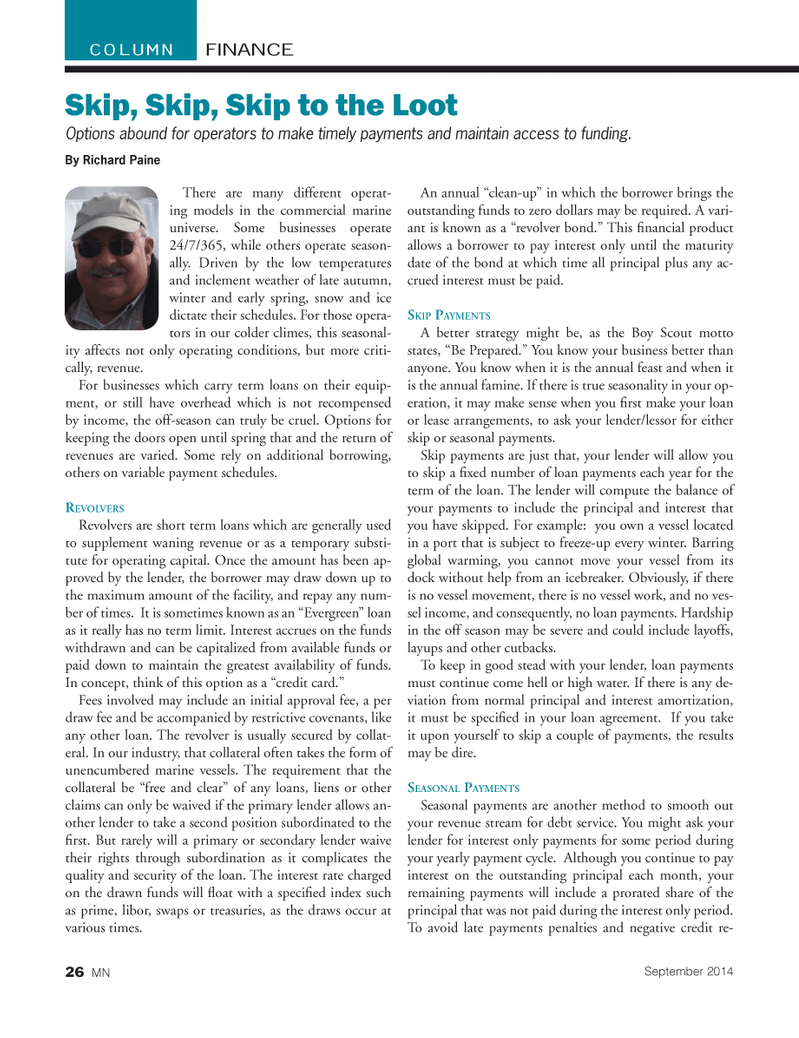
Page 26: of Marine News Magazine (September 2014)
Inland Waterways
Read this page in Pdf, Flash or Html5 edition of September 2014 Marine News Magazine
There are many different operat- ing models in the commercial marine universe. Some businesses operate 24/7/365, while others operate season-ally. Driven by the low temperatures and inclement weather of late autumn, winter and early spring, snow and ice dictate their schedules. For those opera- tors in our colder climes, this seasonal-ity affects not only operating conditions, but more criti- cally, revenue. For businesses which carry term loans on their equip- ment, or still have overhead which is not recompensed by income, the off-season can truly be cruel. Options for keeping the doors open until spring that and the return of revenues are varied. Some rely on additional borrowing, others on variable payment schedules. REVOLVERS Revolvers are short term loans which are generally used to supplement waning revenue or as a temporary substi- tute for operating capital. Once the amount has been ap- proved by the lender, the borrower may draw down up to the maximum amount of the facility, and repay any num- ber of times. It is sometimes known as an ?Evergreen? loan as it really has no term limit. Interest accrues on the funds withdrawn and can be capitalized from available funds or paid down to maintain the greatest availability of funds. In concept, think of this option as a ?credit card.? Fees involved may include an initial approval fee, a per draw fee and be accompanied by restrictive covenants, like any other loan. The revolver is usually secured by collat- eral. In our industry, that collateral often takes the form of unencumbered marine vessels. The requirement that the collateral be ?free and clear? of any loans, liens or other claims can only be waived if the primary lender allows an- other lender to take a second position subordinated to the rst. But rarely will a primary or secondary lender waive their rights through subordination as it complicates the quality and security of the loan. The interest rate charged on the drawn funds will oat with a speci ed index such as prime, libor, swaps or treasuries, as the draws occur at various times. An annual ?clean-up? in which the borrower brings the outstanding funds to zero dollars may be required. A vari- ant is known as a ?revolver bond.? This nancial product allows a borrower to pay interest only until the maturity date of the bond at which time all principal plus any ac-crued interest must be paid. SKIP PAYMENTS A better strategy might be, as the Boy Scout motto states, ?Be Prepared.? You know your business better than anyone. You know when it is the annual feast and when it is the annual famine. If there is true seasonality in your op- eration, it may make sense when you rst make your loan or lease arrangements, to ask your lender/lessor for either skip or seasonal payments.Skip payments are just that, your lender will allow you to skip a xed number of loan payments each year for the term of the loan. The lender will compute the balance of your payments to include the principal and interest that you have skipped. For example: you own a vessel located in a port that is subject to freeze-up every winter. Barring global warming, you cannot move your vessel from its dock without help from an icebreaker. Obviously, if there is no vessel movement, there is no vessel work, and no ves- sel income, and consequently, no loan payments. Hardship in the off season may be severe and could include layoffs, layups and other cutbacks.To keep in good stead with your lender, loan payments must continue come hell or high water. If there is any de- viation from normal principal and interest amortization, it must be speci ed in your loan agreement. If you take it upon yourself to skip a couple of payments, the results may be dire. SEASONAL PAYMENTS Seasonal payments are another method to smooth out your revenue stream for debt service. You might ask your lender for interest only payments for some period during your yearly payment cycle. Although you continue to pay interest on the outstanding principal each month, your remaining payments will include a prorated share of the principal that was not paid during the interest only period. To avoid late payments penalties and negative credit re- FINANCECOLUMNSkip, Skip, Skip to the LootOptions abound for operators to make timely payments and maintain access to funding.By Richard Paine September 201426 MNMN Sept14 Layout 18-31.indd 26MN Sept14 Layout 18-31.indd 268/20/2014 11:43:49 AM8/20/2014 11:43:49 AM

 25
25

 27
27
